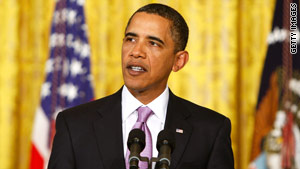Obama to announce bank fees to cover billions in TARP losses

- Obama considers bank fee to ensure taxpayers who helped to bail out banks get repaid
- Treasury Secretary Tim Geithner: bailouts of automakers, AIG will not be paid back in full
- News comes amid new round of executive bonuses on Wall Street
(CNN) -- President Obama, looking to recoup billions in expected losses from the Troubled Asset Relief Program, will announce a plan Thursday to impose fees on the country's biggest financial institutions, a senior administration official told CNN.
The move comes amid public outrage over a new round of big Wall Street bonuses.
The fee on financial institutions would raise up to $120 billion to ensure that taxpayers who bailed out banks are paid back, the official said Tuesday. The figure is at the upper end of a conservative estimate of losses associated with the program and Treasury officials expect the actual number will be much lower.
The law that created the $700 billion program empowered the president to ask Congress to recoup money if bailouts were not paid back in full.
TARP dictates that the Office of Management and Budget consider such action five years after TARP went into effect in October 2008 to prevent the federal bailout from adding to the deficit.
 Video: Big bonus, bigger backlash
Video: Big bonus, bigger backlash
When the TARP bill was hastily debated, the provision was key to winning enough support from wary lawmakers to push the bill through Congress.
Robert Gibbs, the White House press secretary, would not discuss on Monday how a possible bank fee would fit into Obama's fiscal 2011 budget, which is set to be released in February. "When it comes back from Kinko's, we'll be able to talk about it," he said.
But Gibbs said it is the president's "goal" to ensure the "money that taxpayers put up will be paid back in full."
While most of the big banks have started paying back their TARP investments, the government still has a lot of money on the line and is likely to for years to come. Last month, the Treasury estimated that the net cost of TARP to taxpayers would be $41.4 billion.
For example, Treasury Secretary Tim Geithner said last month that the bailouts of the automakers and insurer American International Group would not be paid back in full.
"There is a significant likelihood that we will not be repaid for the full value of our investments in AIG, GM and Chrysler," Geithner told an oversight panel.
Yet, the financial industry fee under discussion could affect the entire financial industry, a prospect the banking industry opposes. With few details available about any proposed fee, it's unclear whether banks would be required to pay for losses incurred by GM and Chrysler.
"Imposing new taxes on top of the increased regulatory costs will weaken the industry, just when the industry is helping lead the economic recovery," said Scott Talbott, chief lobbyist for the Financial Services Roundtable, a bank lobbying group.
The federal bailout program has always been a controversial topic, but news of executive bonuses now being awarded for banks' stellar performance in 2009 is throwing new fuel on populist anger.
A spokesman for the White House's budget office would not confirm or deny reports about a possible fee on banks.
"There are -- and will be -- a lot of rumors about what is in our budget -- most of them wrong," said budget office spokesman Kenneth Baer. "We are not going to get into the game of ruling in and ruling out rumors about what is in our budget."
We recommend
- Up to 2 million jobs from stimulus, White House says CNNMone y
- House panel to subpoena N.Y. Fed over AIG CNNMone y
- FDIC to bonus-loving banks: Pay up! CNNMone y
